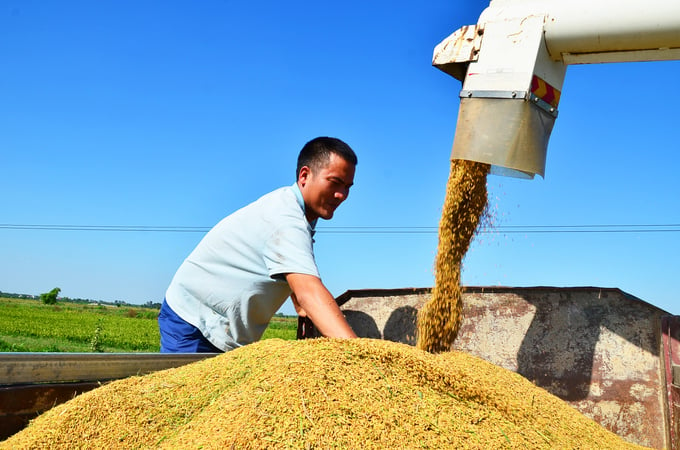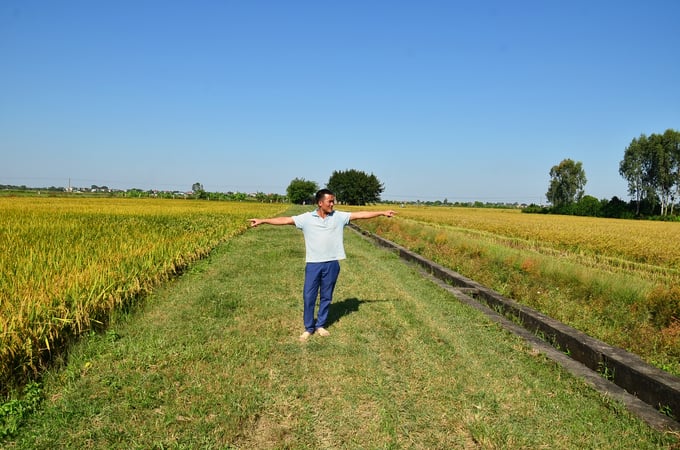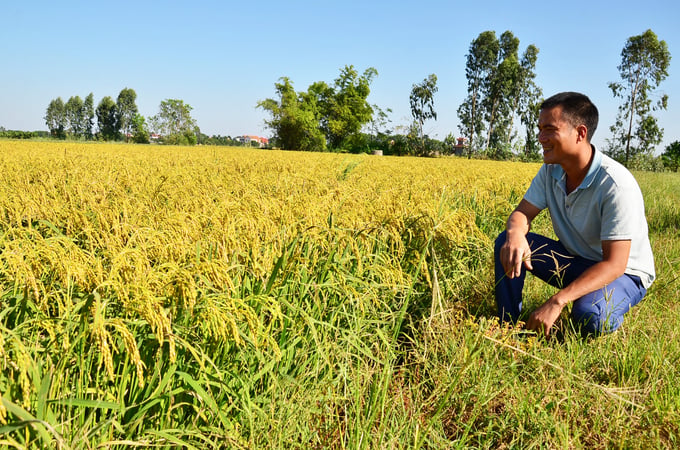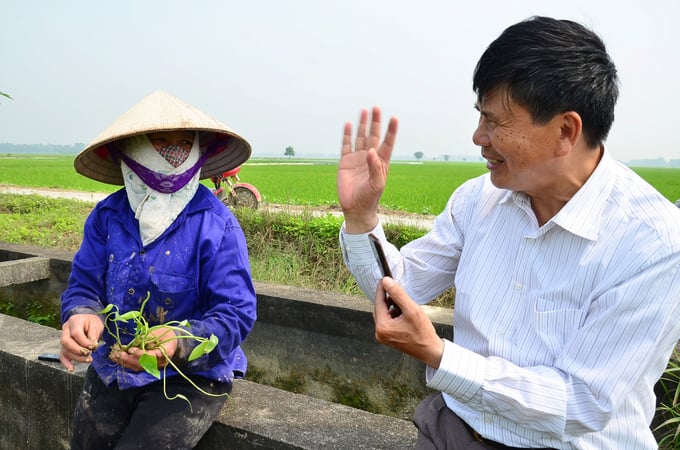June 21, 2025 | 02:45 GMT +7
June 21, 2025 | 02:45 GMT +7
Hotline: 0913.378.918
June 21, 2025 | 02:45 GMT +7
Hotline: 0913.378.918
Nguyen Van Thang - a “big farmer” of Ngo Quyen commune (Thanh Mien district, Hai Duong province) remembered his parents' words when they heard that his son, who attended the University of Mining and Geology, after 5 years of working, suddenly quit his job to return home and ask to work on the fields.
His parents were farmers, so they understood the hardship and want their children to escape that fate. Sharing the same intention, Thang studied hard. After graduating, he worked in the technical department of a mining company in the Northeast region.
Despite having a monthly salary of VND 10 million, he often had to be away from home. Thang had just gotten married, had more children, and his wife had just graduated from school and started to work so the income was quite unstable.
At that time, Ngo Quyen was a commune with the largest number of people going to work abroad in Thanh Mien district, and the economic condition of many families thus became prosperous. But also because of that, the villages soon became "empty". The once fertile fields devoid of sowers gradually became wastelands.

Nguyen Van Thang - a “big farmer” of Ngo Quyen commune feeling happy during the harvest day. Photo: Duong Dinh Tuong.
After a period of consideration, Thang wrote a letter of resignation but did not dare to tell his relatives in advance. Only when he returned to his hometown, everyone knew. Everyone strongly protested, but his parents gave him the harshest words, threatening to disown him if he insisted on “crashing his head” into the field.
Unable to convince them, he worked quietly so that the results of the work would become the answer. In 2014 Thang rented a field from people for VND 70,000/sao (1 sao equals 360 m2) to plant 14 mau of rice (1 mau equals 10 sao) with his brother-in-law. Different from his father’s manual farming like his father, Thang bought a transplanting machine - becoming the second person in the commune to own this modern tool.
First time gathering fields to grow rice, Thang encountered many difficulties. Many abandoned fields were not in the same area, each piece stayed in one place. With bad roads and landslides making it difficult to cultivate, Thang even had to hire an excavator to renovate and clear the weed.
In 2018 he set up a rice seedling factory with 55,000 trays, purchased transplanters, plowing machines, seeding machines and a drying oven with a capacity of 10 tons of paddy/batch. As a result, he could plant 600-700 mau for each crop, 55 of which were from his family in Ngo Quyen and Pham Kha communes, and the rest was him doing service for the people. At first, he had to rent fields in Ngo Quyen, later when people got bored with the field, they gave the field to him rent-free. In Pham Kha commune, he was able to sign a contract with the cooperative to rent 30 mau at the price of VND 110,000/sao/crop.

Nguyen Van Thang in the middle of his large fields. Photo: Duong Dinh Tuong.
“When it comes to farming, no one can say anything in advance, like in the spring crop of 2022, twenty thousand trays of seedlings died for some reason, I already lost VND 300 million, but the crop was also delayed, so I had to pay the people another VND 500 million for the rice seeds. But one fortunate thing is that from the moment I started rice cultivation, I have never suffered loss in any year. The question is only about whether the profit is big or small. Generally speaking, my income is similar to those who go to Japan or Korea to work abroad.
“What’s important is that I am free to do what I like. Every day, I walk around my 55-mau fields but consider it as exercising, meeting the neighbors, breathing fresh air. It’s a great feeling,” Thang said.

Nguyen Van Thang by the bright golden field. Photo: Duong Dinh Tuong.
Thanh Mien is the land that more than 10 years ago, I wrote a series of articles reflecting the farmers' application to return the fields. The story shocked the whole National Assembly because in the past, partly because of the slogan “ones who plow have fields to plow” which resulted in a successful revolution, but now farmers became bored with the fields. Many delegates questioned Secretary of Hai Duong Provincial Party Committee Bui Thanh Quyen about this at that time.
Purely by chance, I returned once again and was able to meet an old acquaintance, "agricultural extension knight" Vu Van Tien - former head of the agricultural extension station in Thanh Mien district. He led me to visit large-scale farming models.
The "agricultural extension knight" is providing technical support to 9 cooperatives in the district at present with each co-op paying him VND 2-5 million/year at will as wages. Another 11 households in the district receive his assistance but he charges no fee.
He said, “The story of ‘big farmer’ started 10 years ago and has grown strongly since 2015. I estimate that there are 18-20 households in the district planting 20 mau or more, more than 20 households planting 5-10 mau or more. Unlike small farming households who are increasingly abandoning their fields, thanks to large-scale production, big farmers can purchase inputs at a cheap price, so even though the selling price of rice is the same, great efficiency calls for great profit.

Vu Van Tien sat right on the edge of the ditch advising farmers on a type of grass while livestreaming. Photo: Duong Dinh Tuong.
“Nguyen Van Thang is a young man who dares to think and act. I have been providing technical advice to this local cooperative for 34 years, now I also give Thang some advice. He only stops asking when the recommendation makes sense, but if he still has some doubts, he would counter-argue until the end. Sometimes when I came to inform him about pests and diseases, he would meet me with a smile and say, “I already sprayed 2-3 days ago", because he could also predict the same type of pest as me. The boy never misses. That's where lies the strength of farmer’s knowledge.”
“Nowadays the formation of ‘big farmer’ is like a law of nature. Those who are still young enough can work as a worker with a salary of VND 5-7 million/month, and those who are over 50-70 years old can still manage to get VND 3-4 million/month. Planting 1 mau of field only gets you VND 1-2 million of profit, not even equal to going to work in the factory for 1 month. Besides, the frequent appearance of natural disasters causes people to be afraid of farming.
“Abandoned fields are many, especially where there is an industrial park or a side job for the people to do. In my estimation, in the future, each commune only needs 3-5 people to plant rice on a large scale. Now there are machines to do it all, so there is no limit on the area anymore. The important thing is the head that can organize production. Now the price of rice is low, and so is the profit of farming, you can still borrow fields. But when the price of rice goes up, the big farmers have to pay rent to the farmers," said Vu Van Tien.
Translated by Samuel Pham
![Turning wind and rain into action: [9] Digitizing hydrometeorological data in response to climate change](https://t.ex-cdn.com/nongnghiepmoitruong.vn/608w/files/news/2025/06/17/z6704423696987_15fd32ffc26d590d204d520c9dac6786-nongnghiep-165943.jpg)
(VAN) Farmers have begun accessing hydrometeorological applications to adjust their cropping schedules, aiming to ensure productivity and adapt to climate change.
![Turning wind and rain into action: [8] Real-time salinity detection and early warning technology](https://t.ex-cdn.com/nongnghiepmoitruong.vn/608w/files/news/2025/06/17/z6704423696987_15fd32ffc26d590d204d520c9dac6786-nongnghiep-151127.jpg)
(VAN) Thanks to the integration of modern hydrological-hydraulic models, remote sensing technologies, and artificial intelligence, the accuracy of hydrological forecasting has significantly improved.
![Turning wind and rain into action: [7] Early disaster warnings help marine farmers minimize losses](https://t.ex-cdn.com/nongnghiepmoitruong.vn/608w/files/news/2025/06/17/z6704423696987_15fd32ffc26d590d204d520c9dac6786-nongnghiep-142942.jpg)
(VAN) In recent years, thanks to early disaster warnings and forecasting, marine farmers in Khanh Hoa province have been able to reduce risks and losses, thereby improving production efficiency.
![Turning wind and rain into action: [6] ‘Four on-the-spot’ disaster management software](https://t.ex-cdn.com/nongnghiepmoitruong.vn/608w/files/news/2025/06/17/e5a48259d6a262fc3bb3-nongnghiep-183800.jpg)
(VAN) By simply activating the scenario on the disaster management software, the relevant authorities immediately know how many households need to be evacuated, where to evacuate them to, and by what means of transportation…
![Turning wind and rain into action: [5] Hue applies modern technology in disaster forecasting](https://t.ex-cdn.com/nongnghiepmoitruong.vn/608w/files/news/2025/06/17/z6704423696987_15fd32ffc26d590d204d520c9dac6786-nongnghiep-093938.jpg)
(VAN) In Hue city, modern technology has recently been applied in meteorological and hydrological forecasting and warning, helping to reduce the damage caused by natural disasters.

(VAN) A cutting-edge farming technique being implemented on an experimental ranch in Arizona's Sonoran Desert has already saved a billion gallons of water over five years, according to Civil Eats.

(VAN) Poultry and pig production and the environment can be boosted through enhanced water technology, according to new research.